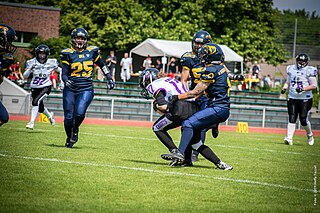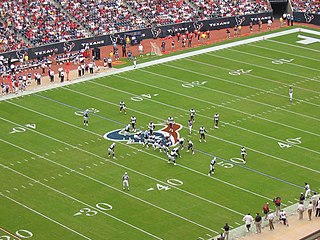Related Research Articles

A down is a period in which a play transpires in gridiron football. The down is a distinguishing characteristic of the game compared to other codes of football, but is synonymous with a "tackle" in rugby league. The team in possession of the football has a limited number of downs to advance ten yards or more towards their opponent's goal line. If they fail to advance that far, possession of the ball is turned over to the other team. In most situations, if a team reaches their final down they will punt to their opponent, which forces their opponent to begin their drive from further down the field; if they are in range, they might instead attempt to score a field goal.

American and Canadian football are gridiron codes of football that are very similar; both have their origins in rugby football, but some key differences exist between the two codes.

In sports, a time-out or timeout is a halt in the play. This allows the coaches of either team to communicate with the team, e.g., to determine strategy or inspire morale, as well as to stop the game clock. Time-outs are usually called by coaches or players, although for some sports, TV timeouts are called to allow media to air commercial breaks. Teams usually call timeouts at strategically important points in the match, or to avoid the team being called for a delay of game-type violation, such as the five-second rule in basketball.

Gameplay in American football consists of a series of downs, individual plays of short duration, outside of which the ball is dead or not in play. These can be plays from scrimmage – passes, runs, punts, or field goal attempts – or free kicks such as kickoffs and fair catch kicks. Substitutions can be made between downs, which allows for a great deal of specialization as coaches choose the players best suited for each particular situation. During a play, each team should have no more than 11 players on the field, and each of them has specific tasks assigned for that specific play.
In gridiron football, clock management is an aspect of game strategy that focuses on the game clock and/or play clock to achieve a desired result, typically near the end of a match. Depending on the game situation, clock management may entail playing in a manner that either slows or quickens the time elapsed from the game clock, to either extend the match or hasten its end. When the desired outcome is to end the match quicker, it is analogous to "running out the clock" seen in many sports. Clock management strategies are a significant part of American football, where an elaborate set of rules dictates when the game clock stops between downs, and when it continues to run.
The Fifth Down Game was a college football game on October 6, 1990, that included a play that the crew officiating the game permitted to occur in error. That play enabled the Colorado Buffaloes to defeat the Missouri Tigers by scoring a touchdown at the end of the game. The ensuing controversy cast doubt on Colorado's claim to Division I-A's 1990 national championship, which it went on to share with the Georgia Tech Yellow Jackets. It has been called one of the top memorable moments and blunders in college football history.

In American football and Canadian football, a quarterback kneel, also called taking a knee, genuflect offense, kneel-down offense, or victory formation, occurs when the quarterback touches a knee to the ground immediately after receiving the snap, thus downing himself and ending the play. It is primarily used to run the clock down, either at the end of the first half or the game itself, to preserve a lead. Although it generally results in a loss of some yardage and uses up a down, it minimizes the risk of a fumble, which would give the other team a chance at recovering the ball.
In most levels of professional American football, the two-minute warning is a suspension of play that occurs when two minutes remain on the game clock in each half of a game, i.e., near the end of the second and fourth quarters, and overtime. Its effect on play is similar to that of a timeout: the game clock stops and the teams gather to discuss strategy. The suspension of play is two minutes long, the same as the short two-minute intermissions between quarters within each half. Its name reflects its origins as a point in the game where the officials would inform the teams that the half was nearly over, as the official game clock was not displayed in the stadium at the time the two-minute warning was created.
In gridiron football, intentional grounding is a violation of the rules where "a passer...throws a forward pass without a realistic chance of completion." This typically happens when a quarterback about to be sacked passes the ball toward an area of the field with no eligible receiver. Without this rule, the quarterback could almost always avoid a sack by intentionally throwing an incomplete pass ; instead, the penalty of intentional grounding effectively continues play as if the defense had succeeded in sacking the quarterback.
The following terms are used in American football, both conventional and indoor. Some of these terms are also in use in Canadian football; for a list of terms unique to that code, see Glossary of Canadian football.

In gridiron football, a penalty is a sanction assessed against a team for a violation of the rules, called a foul. Officials initially signal penalties by tossing a bright yellow colored penalty flag onto the field toward or at the spot of a foul.
In gridiron football, replay review is a method of reviewing a play using cameras at various angles to determine the accuracy of the initial call of the officials. An instant replay can take place in the event of a close or otherwise controversial call, either at the request of a team's head coach or the officials themselves.
The 2011 UCF Knights football team represented the University of Central Florida in the 2011 NCAA Division I FBS football season. The Knights played in the East Division of Conference USA, and played their home games at Bright House Networks Stadium in Orlando, Florida. The Knights were led by head coach George O'Leary, who was in his eighth season with the team. They finished the season 5–7, 3–5 in C-USA play to finish in a tie for fourth place in the East Division.
The 2014 UCF Knights football team represented the University of Central Florida in the 2014 NCAA Division I FBS football season. The Knights were members of the American Athletic Conference, and played their home games at Bright House Networks Stadium on UCF's main campus in Orlando, Florida. The Knights were led by head coach George O'Leary, who was in his eleventh season with the team.

The 2018 UCF Knights football team represented the University of Central Florida (UCF) during the 2018 NCAA Division I FBS football season. They played their home games at Spectrum Stadium in Orlando, Florida, and were led by first-year head coach Josh Heupel. The Knights competed as members of the East Division of the American Athletic Conference. The 2018 season marked the 40th season of football for the Knights program.

The 2019 UCF Knights football team represented the University of Central Florida (UCF) during the 2019 NCAA Division I FBS football season. The Knights were led by second-year head coach Josh Heupel and played their home games at Spectrum Stadium in Orlando, Florida. They competed as members of the East Division of the American Athletic Conference.

The 2020 UCF Knights football team represented the University of Central Florida (UCF) during the 2020 NCAA Division I FBS football season. The Knights were led by third-year head coach Josh Heupel and played their home games at Bounce House in Orlando, Florida. They competed as members of the American Athletic Conference. The Knights finished the regular season 6–4 and notably did not have any games of their revised schedule postponed or canceled due to the COVID-19 pandemic.

The 2021 UCF Knights football team represented the University of Central Florida (UCF) during the 2021 NCAA Division I FBS football season. The Knights were led by first-year head coach Gus Malzahn and played their home games at Bounce House in Orlando, Florida. They competed as members of the American Athletic Conference.

The 2022 UCF Knights football team represented the University of Central Florida (UCF) during the 2022 NCAA Division I FBS football season. The Knights were led by second-year head coach Gus Malzahn and played their home games at FBC Mortgage Stadium in Orlando, Florida. They competed as members of the American Athletic Conference.
References
- 1 2 "Tulane Green Wave vs. UCF Knights - October 18, 2014 - ESPN". ESPN. Associated Press. October 18, 2014. Retrieved November 13, 2014.
- 1 2 Adamson, Scott (14 August 2013). "New rule takes guesswork out of spiking the ball". Anderson Independent-Mail . Retrieved 19 November 2021.
- ↑ Adelson, Andrea (28 November 2020). "Syracuse coach Dino Babers calls late fourth-and-goal spike 'unfortunate'". ESPN.com . Retrieved 19 November 2021.